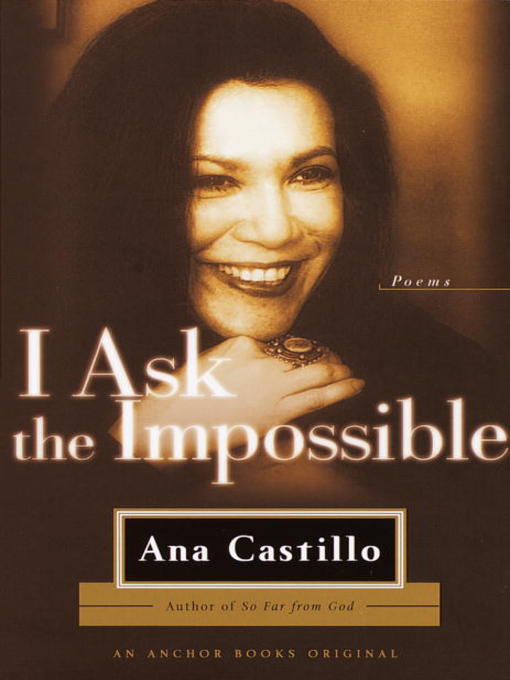
I Ask the Impossible
Poems
کتاب های مرتبط
- اطلاعات
- نقد و بررسی
- دیدگاه کاربران
نقد و بررسی

March 19, 2001
The prolific novelist, poet, essayist and xicanista Castillo checked in most recently with My Daughter, My Son, The Eagle, The Dove: An Aztec Chant, an inspirational gift book, and Peel My Love Like an Onion, a first-person tale of immigration and reimagined selfhood. This fifth poetry collection displays all the energy and political commitment of Castillo's work in other genres, but holds few formal or conceptual surprises. Nevertheless, many readers will be happy to bask in their speaker's experiences and longings or to get angry and motivated by her cries for justice: "Women don't riot,/ not in maquilas in Malaysia, Mexico, or Korea..../ We don't storm through cities,/ take over the press, make a unified statement,/ once and for all: A third millennium call--from this day on no more, not me, not my daughter,/ not her daughter either." Over the course of 60 sometimes multilingual, mostly page-or-less monologues, Castillo's speaker brashly addresses the pope, celebrates Zapatista leader Comandante Ramona, eulogizes friend Dieter Herms, sits alone in a new city ("I have had PMS for three days./ If I drink myself into a stupor, who'll know?"), imagines being seduced by Nastassia Kinski and goes about her business with passion and dignity. The abundant erotic parables and mystical invocations work much less well, often filled with clich s and awkward cadences. But the point here is in the immediacy and the message; this book is worth its weight in a thousand arid ekphrases and aestheticizations. (Mar. 27) Forecast: Nothing much distinguishes these poems from those of many other mestiza feminists speaking out in small presses across the country--except Castillo's relative fame, which adds to her speaker's winning confidence. Fans from her other genres will see Castillo's bright smile on the cover of this book and pick it up.

January 1, 2001
Castillo enjoys an enviable reputation as a novelist, essayist, and poet, the latter evident in this collection. Although several of these poems have appeared previously in print, including the contemporary classic "El Chicle," this anthology represents the cumulative product of Castillo's poetic muse under one cover. Her commitment to social protest, as seen earlier in My Father Was a Toltec: And Selected Poems, is renewed here in several poems which, as the weakest and most routine of the lot, are less likely to stand the test of time. In their immediacy, however, the poems dealing with death strike a more universal chord; we share Castillo's emotions and inquisitions as she confronts the prospect of death in her family and, ultimately, in herself. Castillo also continues the work she has done in an amorous vein; the titular poem is simple, lyrical, and poignant. In sum, this retrospective provides a delightful and enticing orientation to one of the most outstanding Chicanas writing today.--Lawrence Olszewski, OCLC Lib., Dublin, OH
Copyright 2001 Library Journal, LLC Used with permission.

March 1, 2001
Castillo, whose much-treasured novels include " Peel My Love Like An Onion" (1999), writes that poetry is her "indulgence," her "companion," and her "refuge." Her fifth collection spans the last 11 years and presents poems alight with stubborn love, crackling wit, and towering anger. Earthy and well molded like clay, Castillo's poetry serves as a vessel for emotions as she rails against the injustices of women's lives, especially the betrayals of church and state that crush the souls of poor women of color. Castillo writes on behalf of the voiceless and nameless and in praise of such heroines as Comandante Ramona, a Zapatista leader; Anna Mae Aquash, a murdered Indian rights activist; and Sister Dianna Ortiz, who suffered grievous torture in Guatemala. Castillo writes, too, of her late mother, her thriving son, and the spiky ironies of love, always willing to face the painful truths of human life but always finding her way to beauty.(Reprinted with permission of Booklist, copyright 2001, American Library Association.)

























دیدگاه کاربران